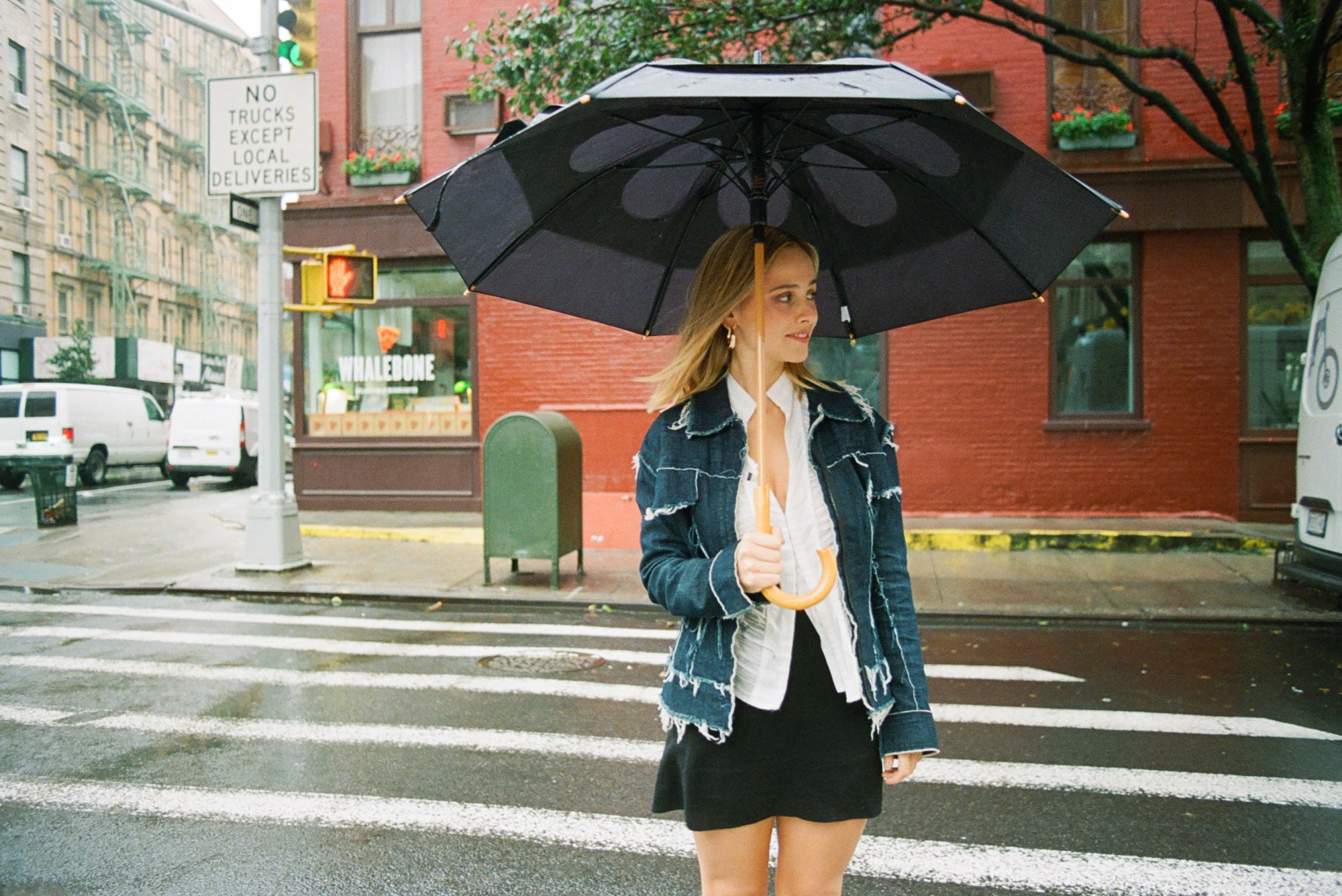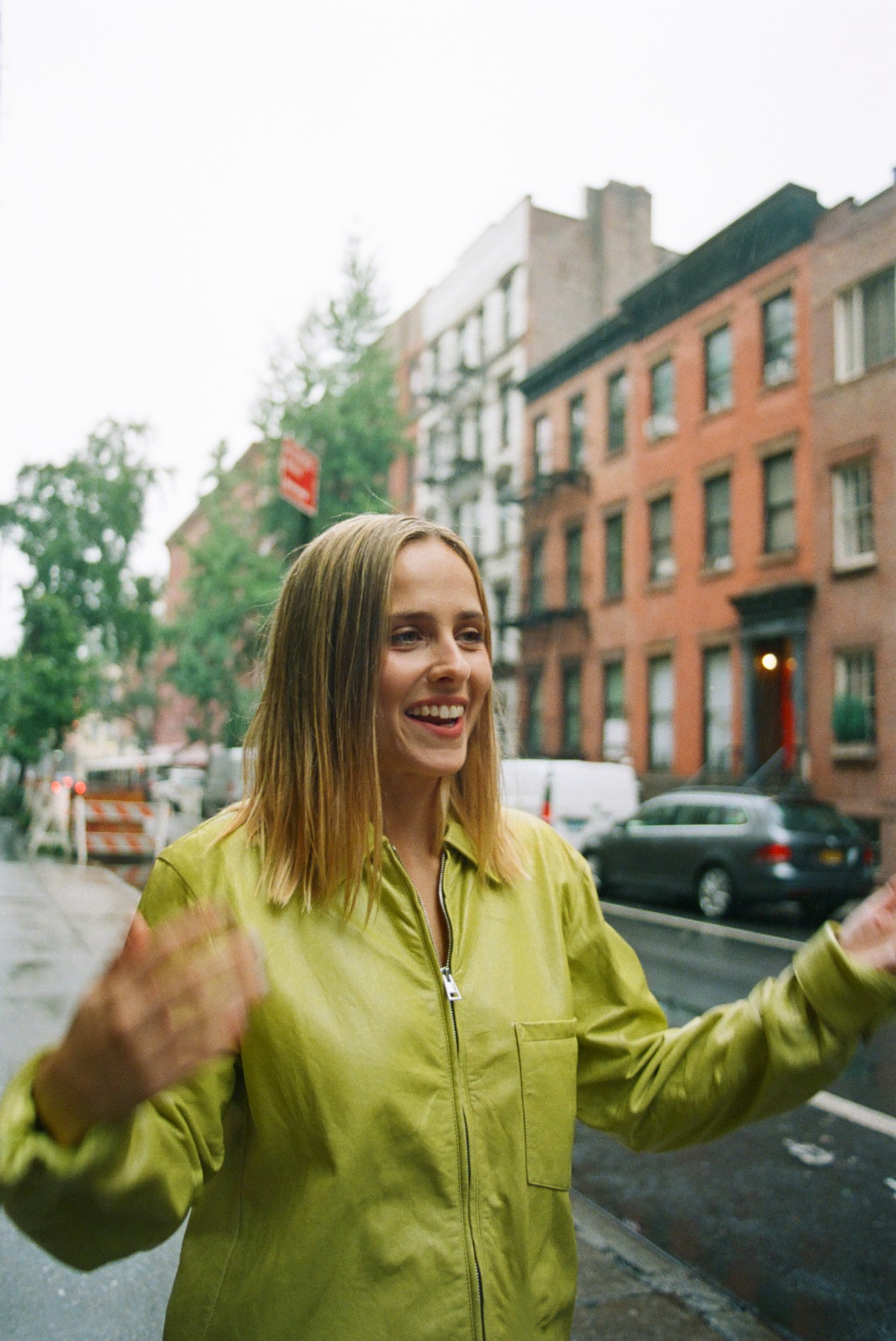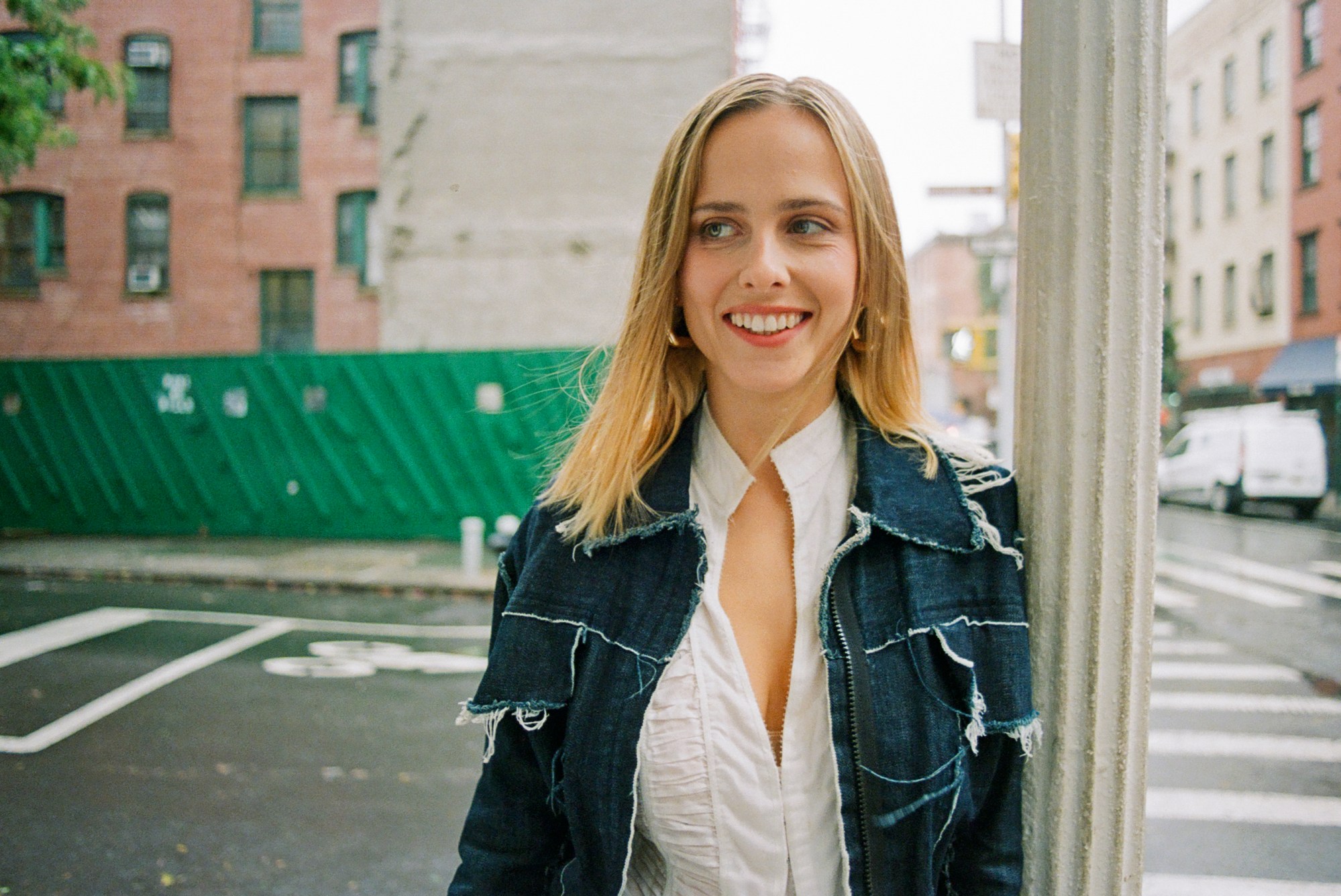In a cafe on a rainy morning in New York City’s West Village, Pauline Chalamet is buzzing. “I’m very impatient,” the actor, writer and producer says, tearing apart tough bread and dipping it into olive oil. “I want to make stuff happen.”
Over the course of her seven-year career, she’s learned how to bring projects to life, whether it’s through her recognisable performances or writing, directing, and sometimes starring in her own Paris-set shorts.
For her latest, What Doesn’t Float, she wanted it to ‘be’ so badly that she and her friends built a whole production company to make it happen. Enter: Gummy Films. Four years in the making, What Doesn’t Float – the production company’s first feature, which was released in the US this September – is an anthology movie that sees vignettes of New Yorkers brought to the brink of insanity, each segment set in Brooklyn and somehow revolving around water (hence the title). Needless to say, Pauline stars in one of them, in which a motorcycle stud takes her on a romantic joyride, only to severely disappoint her.

What Doesn’t Float was always meant to be a first, not an only. Before starting production on the film, Pauline and company leaned into their collective momentum and created Gummy Films in 2019. The do-it-all production company was founded alongside editor and director Luca Balser and producer and director Rachel Walden.
There are already over 30 projects to Gummy’s name, ranging from genre-spanning short films to several Brockhampton music videos to tasteful commercials for the fashion brand Dockers. Now, four years on, they have an office in Dumbo. “Rachel and Luca really hold down the fort,” she says. “He has an editing bay there, and Rachel’s, like, always producing. The girl does not stop. She’s a firecracker.”
Shauna, Pauline’s good friend from high school, initially pitched What Doesn’t Float to Pauline over drinks, and she was over the moon about it. As they were leaving, they ran into Luca, Shauna’s childhood friend from Brooklyn, and gave him the scoop. Not long after, Luca introduced them to Rachel; they loved her, and the rest was history.
The film, much like the production company, radiates a homegrown approach, with much of the cast and crew pulled from Pauline and co’s lifelong New York social circles. “That’s the thing that really blows me away about What Doesn’t Float. It’s been four years since we made this, but I look at how many people in the movie I’ve known since I was a kid, and all these memories come flooding back.”
Pauline was born and raised in Hell’s Kitchen in midtown Manhattan, alongside a third-generation New York mother, a French father and her younger brother Timothée. She attended two New York academic institutions – LaGuardia High School and Bard College – where she studied theatre and performance but ended up double majoring, tacking on a political studies degree too.
Her list of inspirations comes from an adolescence steeped in good movies. She mentions Noah Baumbach (the tennis scene in The Squid and the Whale makes her laugh; “I don’t know what that says about my family dynamics”), Greta Gerwig, Janicza Bravo, Kelly Reichardt, Kitty Green, Lila Neugebauer, Eliza Hittman, Kris Borgli, Sean Baker and Ira Sachs, among others. But the spirit of the list lies in a trinity of French filmmaking women: Audrey Diwan, Mia Hansen-Løve and, most importantly, the late Agnès Varda, whose work she regularly turns to.
“Varda is a huge influence of mine,” Pauline says. “She’s the queen – well, really the king – of blending documentary and fiction, and I’m so drawn to that. When you have a grab-and-go necessity, you inevitably end up shooting a kind of docufiction thing because you’re filming what is. And there’s less room to create a world around it.”
Fresh out of Bard in 2014 – perhaps following her Francophone instincts – she moved to Paris, unbeknownst to her family. “I was a little lost, working odd jobs,” she says. It takes her a second, then she remembers them: “Babysitting, copy editing, helping run a bilingual acting school, [I] worked in a lot of cafes, restaurants, bars – Oh! A rock ‘n roll bar that closed at 6 in the morning.”
In Paris, it wasn’t long before she followed in Varda’s footsteps and dove headfirst into filmmaking, writing, editing, producing, and directing her own shorts. By 2016, she had written, directed, and starred in her first short, Between Fear and Laughter, and by 2017, she had already starred in three more, one of which she wrote and produced.

“I always felt like I wanted to do it all, so I was doing a little bit of everything to start out. And then I just loved acting. And as more interesting projects came my way I was like, ‘Oh, that’s what I’m really interested in.” She has “a control problem,” she says, which may explain why she’s taken so naturally to producing after accruing most of her experience in front of the camera, “but at the same time I don’t like being the one who makes decisions.”
The SAG-AFTRA strike has put a hold on much screen acting at the moment anyway (What Doesn’t Float, an independent production, received a waiver). The negotiations have barely moved since the strike started in July. “I’m slightly taken aback that it’s taken this long,” she says, “but I also think it kind of makes sense, [considering] the times that we’re in and how much of a disconnect there is between people who have power and people who don’t. It makes me really angry.”
If, as a producer, she can help play a part in correcting that imbalance, she will. “The nature of this business is unfair,” Pauline says. “No one can ever go into any artistic field and think they’re owed something or think that anything is fair. My workaround for that is helping to generate the work.”
For the future, Pauline has her eye on feature films and “director-driven stories” that she and the Gummy cohort can get behind. “You know, we have overhead now, so we’re going for all the work we can get,” she says, “but we always want to have a few features that are really dear to us that we’re looking for financing for.” As a sturdy production company with plenty of projects on their hands, their production diet is finally something they can talk about with a sense of completion, despite the fact they’re just getting started.
With this much on her plate, I wonder about her hobbies. She thinks hard and draws a long pause as if she wants some but can’t find the time. An avid reader and pop culture fanatic, she highlights two recent loves that, together, represent her taste as much as they do the duality of humanity in the doom-scrolling age: feminist philosopher Jacqueline Rose’s new book, The Plague: Living Death in Our Times, and Olivia Rodrigo’s new chart-topping sophomore album. Amidst making so many things happen, she still finds the time to read and, like the rest of us, listen to Guts.
Credits
Photography Sabrina Santiago



